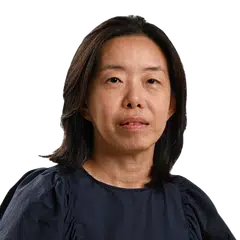A soldier’s last battle: At 95, he yearns for North Korea but grieves leaving family behind
Sign up now: Get insights on Asia's fast-moving developments
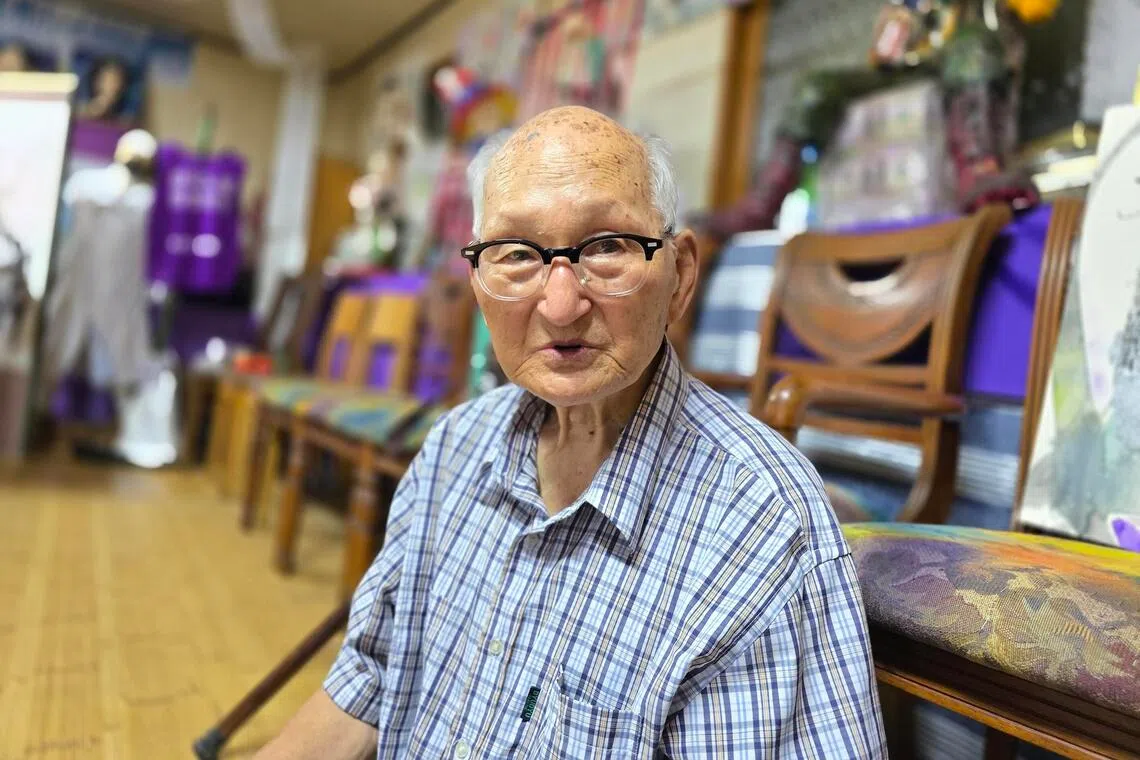
Mr Ahn Hak-sop, 95, a former North Korean soldier, knows that the likelihood of him setting foot in North Korea is dim.
ST PHOTO: WENDY TEO
- Ahn Hak-sop, a 95-year-old former North Korean soldier, seeks repatriation to North Korea from South Korea, viewing the South as a "US colony state".
- Despite setbacks, including family issues and a failed border crossing, Ahn's wish to die in North Korea persists due to his strong ideological beliefs.
- South Korea is reviewing Ahn's request, complicated by severed communication channels and Kim Jong Un's declaration of the South as a "hostile state".
AI generated
GIMPO – Former North Korean soldier Ahn Hak-sop, 95, is living out his last days in a small church in South Korea, located just about 2km from the North.
The Mintongseon Peace Church in Yonggang village is a short drive from barbed wire fences demarcating the Demilitarised Zone (DMZ), which has separated the two Koreas since the war ended in an armistice in 1953. The two Koreas are technically still at war today.
This is the closest Mr Ahn can get to what he considers the true sovereign Korea, free from the “imperialist control of the United States”, which he says South Korea is under.
“The real issue for our country isn’t just North-South relations; it is the Korea-US relationship. We need to drive America out of our country, only then can we reclaim true sovereignty. Without sovereignty, we are just slaves,” he told The Straits Times.
Despite being born in 1930 on Ganghwa Island, which is part of the Incheon metropolitan city and falls south of the 38th parallel separating the two Koreas, Mr Ahn chooses to identify as North Korean.
Along with five other “unconverted” North Korean loyalists aged between 80 and 96, Mr Ahn submitted a request to the Seoul government in July seeking repatriation to North Korea. It is his last wish to die on North Korean soil, not in what he calls the “US colony state” of South Korea.
The group – five men and one woman – had spent decades in prison for their communist leanings. Among them, Mr Ahn served the longest sentence, spending more than 42 years in jail on espionage charges before he was finally pardoned in 1995.
On Aug 22, the nonagenarian even attempted to totter over to North Korea on foot, supported by friends and a walking cane. Despite his courage, the effort was futile, as he was turned away by South Korean guards.

Mr Ahn Hak-sop gazing at North Korea in the distance beyond the barbed wire fence separating the two Koreas.
ST PHOTO: WENDY TEO
South Korea’s Unification Ministry said it is reviewing the loyalists’ request, but told The Straits Times that the process is difficult as “consultations with North Korea and cooperation among relevant agencies are necessary”.
Communication channels between the two Koreas have been cut off since Pyongyang blew up a joint liaison office
In January 2024, North Korean leader Kim Jong Un declared Seoul to be Pyongyang’s “primary foe and invariable principal enemy”, saying that unification was no longer possible.
Months later, in October 2024, Pyongyang officially amended its Constitution to designate South Korea a “hostile state”, even using explosives to destroy the northern parts of unused inter-Korea road and rail links.
The administration of new South Korean President Lee Jae Myung has attempted to dial down tensions by ceasing all propaganda broadcasts to the North, with the goal of restarting dialogue.
However, Mr Kim’s powerful younger sister Kim Yo Jong rebuffed the overtures on Aug 21,
As for Mr Ahn, a series of personal setbacks after his highly publicised bid to return to North Korea has somewhat shaken his resolve.
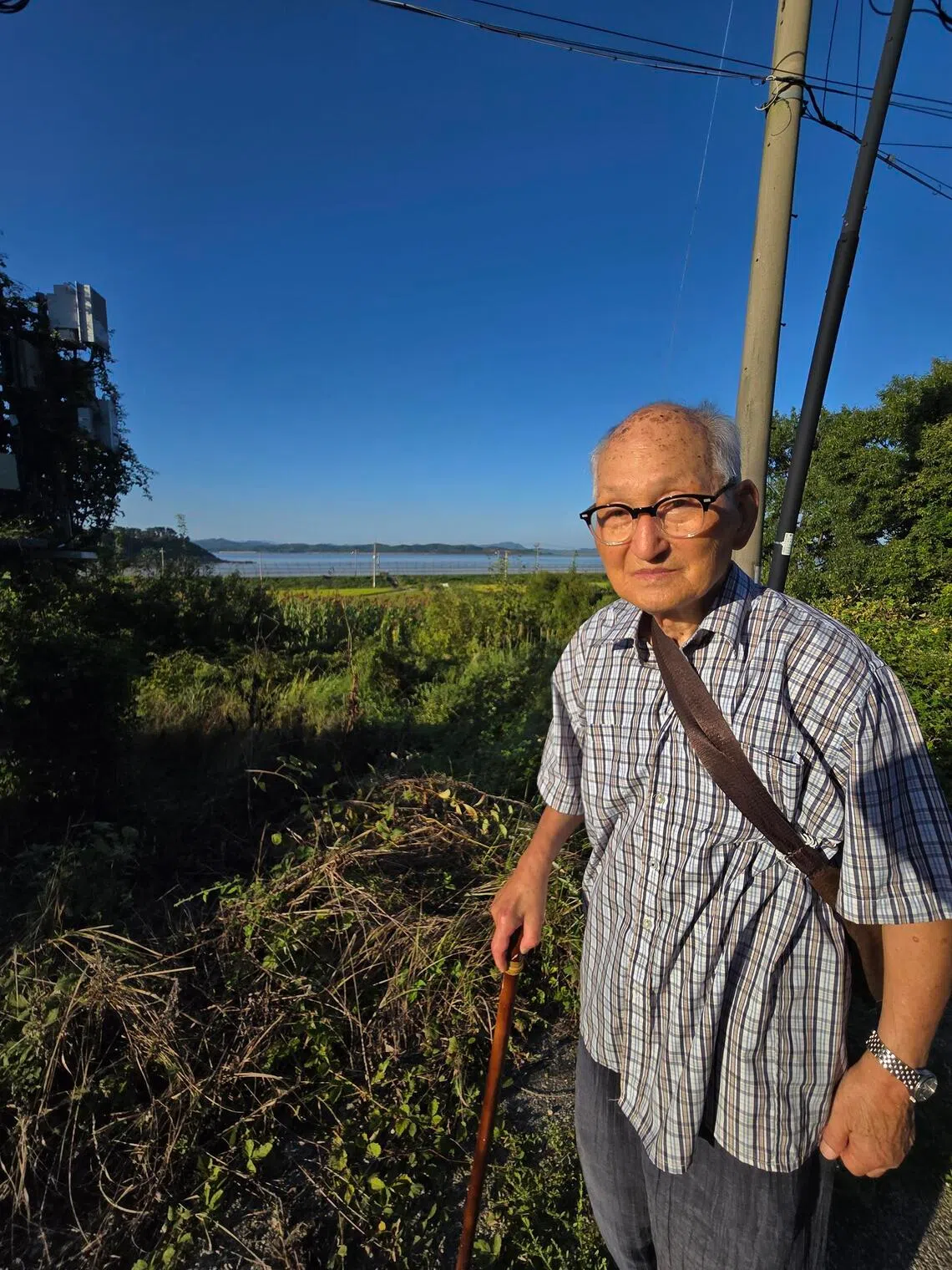
Mr Ahn Hak-sop now lives at the Mintongseon Peace Church, located within the Civilian Control Zone of Yonggang village in Gimpo City, where North Korea can be seen clearly.
ST PHOTO: WENDY TEO
His adoptive daughter, a papier mache artist who shared his fervent anti-American views and whose works fill the tiny church hall, died of late-stage lung and bone marrow cancer two weeks after he attempted to cross the border.
His wife, who is 30 years his junior, had to be admitted to a hospice as her dementia was getting too much for him to handle.
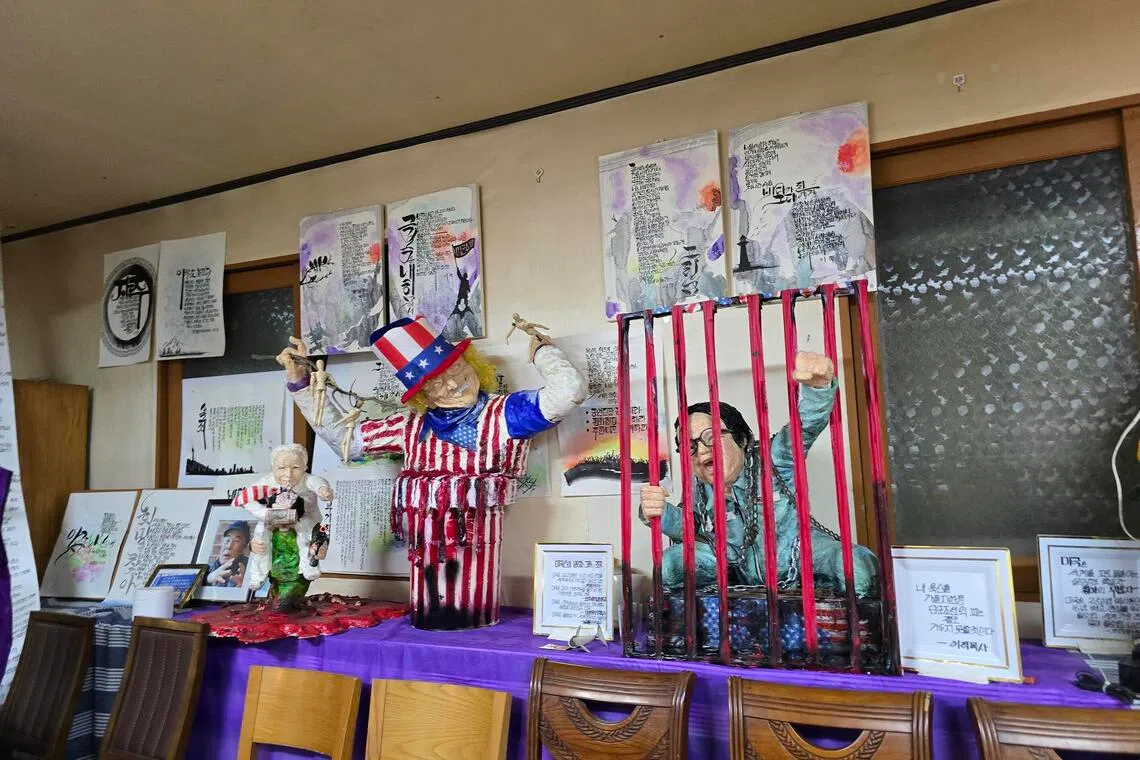
The Mintongseon Peace Church, where former North Korean soldier Ahn Hak-sop now resides at, is filled with anti-US papier mache art made by his late adoptive daughter Jeong Mi-sook.
ST PHOTO: WENDY TEO
To top it off, his youngest sister – the only family member who had stayed in contact with him despite his ideological leanings – suddenly cut off all ties and would not take his phone calls.
Mr Ahn is unsure what went wrong, and his attempts to apologise through his niece have failed. “If I did something wrong, I take responsibility for it,” he said.
That sister represents his last ties to the family, which had suffered from being labelled as communist during his long imprisonment.
Mr Ahn is the third of five siblings – three sons and two daughters. His eldest brother died while fighting for the Japanese during World War II and his second brother was an army deserter. Mr Ahn avoided being drafted into the war after his father sent him to hide in his aunt’s home.
During this period, he grew to resent the oppression – first by the Japanese and then the US, which took control after the Japanese surrendered.
As a teenager, he made his way to Kaesong in the north, where he attended school and started reading Marxist-Leninist literature, through which his socialist beliefs took root.
He joined the North Korean army as an intelligence officer during the Korean War from 1950 to 1953 and was captured by the South’s forces in April 1953, three months before the armistice was signed.
After his release from prison in 1995, Mr Ahn tried returning to the family home on Ganghwa Island, but was kicked out by his nephew, who threatened to break his legs and kill him if he ever returned.
“He said that he did not want his son to grow up with communist beliefs like I did,” recalled Mr Ahn. His two younger sisters had pleaded with him at the time to renounce communism, but he refused.
Thirty years on, Mr Ahn suffers from poor eyesight and hearing, and has a pulmonary edema condition where fluid accumulates in the lungs. He knows his days are numbered.
“On the way home after being turned away from the bridge, I lost consciousness in the car and was sent to the emergency room,” he told ST.
“When I regained consciousness, I looked around and the anger welled up inside me. I’ve endured all kinds of humiliation in this ‘colony’. Now that I’m almost a hundred years old, I can die today or any day. Am I just going to die here?”
Despite his resolve to die in North Korea, Mr Ahn’s tough composure falters when he talks about his wife and the death of his adoptive daughter.
“My wife used to be very selfless and tolerant, but now she speaks nonsense and asks for money all the time. After I get over my anger, I cry. I ask myself how things turned out this way, how we ended up like this. And my chest feels like it is going to burst,” he said, his voice breaking.
When asked how he felt about leaving his unwell wife behind in South Korea in his pursuit of returning to the North, Mr Ahn admitted that he was at a loss.
“Even as I speak to you, my head is in a mess,” he said.
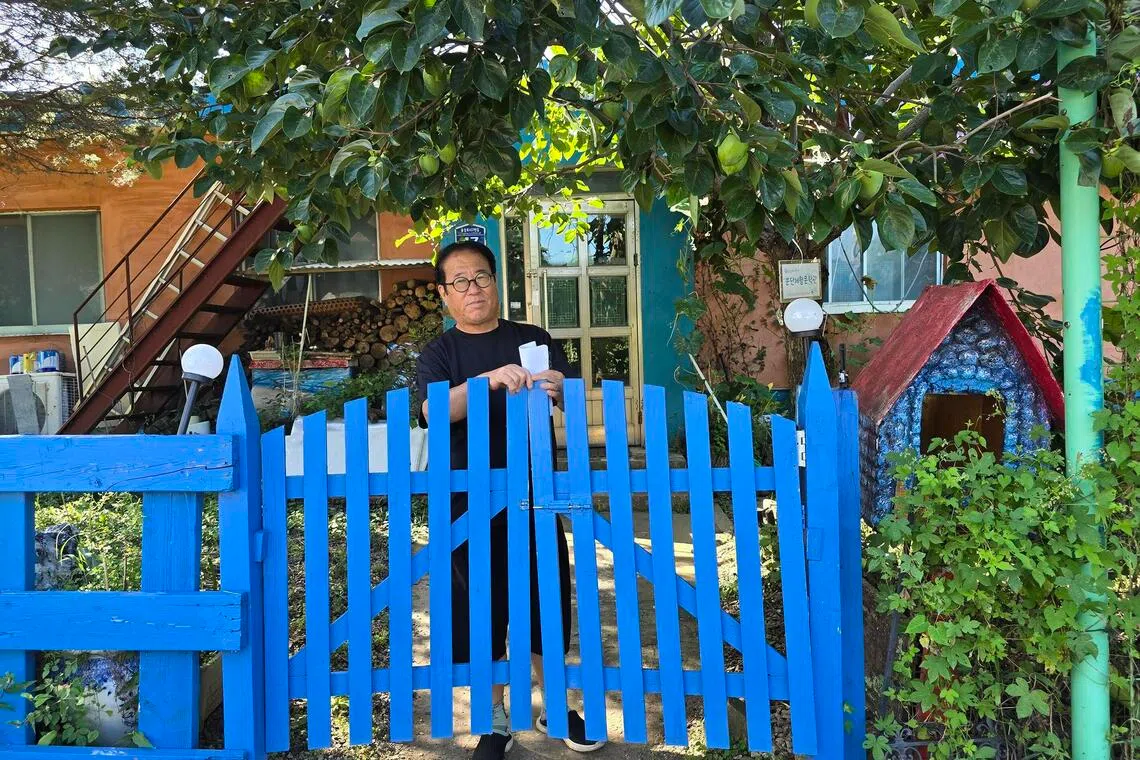
Mr Lee Jeok is the founder of Mintongseon Peace Church, located within the Civilian Control Zone of Yonggang village in Gimpo City.
ST PHOTO: WENDY TEO
It also weighs heavily on him to leave behind his adoptive son-in-law. The pastor of Mintongseon Peace Church has been helping him in his campaign to return to North Korea.
Mr Ahn knows that the likelihood of him setting foot in North Korea is dim.
“At least, bury my ashes there,” he said in a subdued voice.
As we drove out of the village for dinner, Mr Ahn gazed beyond the barbed wire fence, where North Korea can be seen.
“After the war, many mothers came here crying and trying to see the children they left behind on the other side after the two Koreas were divided,” he said.
“We share the same rain, and the same birds fly over us, so why are we still separated?”


